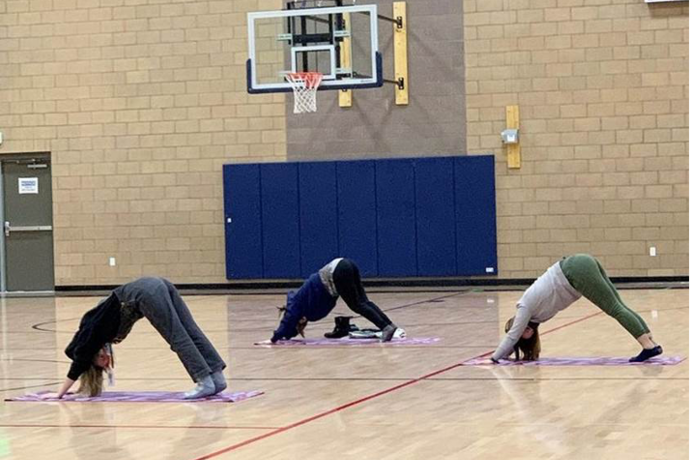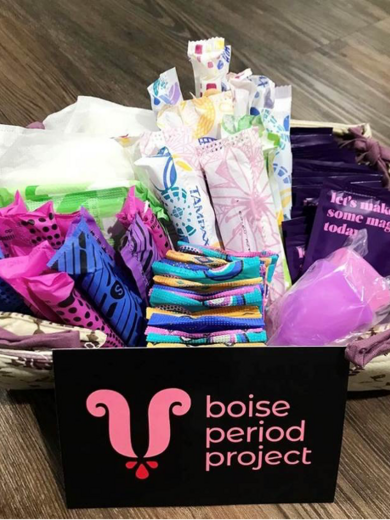Hannah Green (Idaho ‘21) has Partnered with Local Organizations to Support her Pregnant and Parenting Students at Cardinal Academy

February 2, 2022
Hannah Green describes herself as a “stand up and take charge” kind of person, so her Teach for America Idaho placement at the brand-new Cardinal Academy charter school for pregnant and parenting teens in Boise seems like a perfect fit.
Hannah, a graduate of Northern Arizona University, started as a pre-med student, but discovered while working in schools to pay her way through college that she loved teaching more than medicine. She applied to TFA and ended up in Idaho. She couldn’t be happier.
As Cardinal Academy establishes its practices and procedures in its first year, the unique needs of its student population come into ever-sharper focus. As a first-year science teacher, Hannah immediately noticed that the challenges her students face include such total physical and emotional exhaustion on some days that classroom learning becomes impossible.
Rather than growing frustrated or trying to convince those students to push through, Hannah came up with a solution to tackle the problem head-on. She applied for and received a $400 grant from CapEd Credit Union to buy 15 tri-fold padded mats that students can place on the concrete classroom floor if they need a few minutes (or more) of shut-eye. It has made all the difference.
“If you're sleep deprived and you're taking care of kids, sometimes you're just not going to have a good day and you're going to be in fight-or-flight mode,” Hannah said. “And I can just be like ‘Hey, I think it might be time to pull out a mat and have you take a minute.’
“Two of my students have twins, so you can imagine the night feeding schedules with newborns,” Hannah said. “Some mornings they will come in and drop their kids off at the (on-site) daycare and tell me ‘this is the first time in eight hours I don't have someone crying.” I say OK, we'll just take down your mat and you can take some minutes for yourself. And they knock out as soon as their head hits the mat.”
Sometimes a pregnant student will be experiencing lower lumbar pain, and will be more comfortable in class lying on a mattaking lecture notes than sitting in a hard school chair. That, too, is fine with Hannah.
How did Hannah come up with the idea to write a grant for mats? By observing her students and their needs. While her summer TFA training “gave me a bunch of resources,” Cardinal Academy’s student demographic is so singular that “there was no specific person I could turn to that had had this experience. So I came in with the mindset that the students are going to show me what they need.”

Hannah also learned during her first semester that what some of her students need most is a sympathetic listener, one who is willing to share in the joys and challenges of young parenthood.
“If you need to come in and have someone cheer you on because there was no one at home to be happy with you that you passed your driver’s test, or that baby took her first steps, that’s a role I can play,” she said.
Another issue Hannah quickly discovered that needed addressing was her students’ – female and male alike – lack of knowledge about the biology of the reproductive cycle, and specifically about menstruation. Many of her female students lacked dependable access to menstrual products, so not only did Hannah stock her classroom with supplies, donated by the Boise Period Project, but she decided to provide a tutorial on the topic.

While it might seem that students who are pregnant or parents would understand how conception and pregnancy work, especially given that Cardinal students are mostly in their late teens or even early 20s, the lack of knowledge caught Hannah’s attention.
“So I became the period queen and teacher,” Hannah said with a laugh. “I took a huge unit out of my biology class to teach about menstruation and menstrual products.” At first, she said, students resisted. “They weren't really paying attention. And I was like, guys, what's up and they said, ‘Dude, we already have a kid, we know how all of this works.”’ So she wrote up a 20-question quiz on human reproduction.
“The class average was 20 percent correct answers, and that’s including our mothers. After that they were like, ‘oh, OK, you might know something. You might be able to teach us something about this after all.’”


